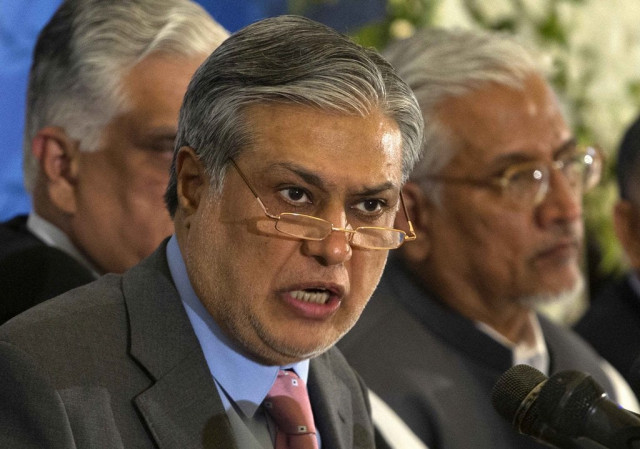Senate panel opposes cabinet’s powers for Dar
If government’s proposals are passed by parliament, it would undermine previous tax reforms

Finance Minister Senator Ishaq Dar. PHOTO: REUTERS
While beginning the clause-wise scrutiny of the Finance Bill 2017, the Senate Standing Committee on Finance and Revenue raised objections to extending all Statutory Regulatory Orders by June 2018 and granting powers to change tax scope and give exemptions to the official incharge, the finance and revenue minister.
Finance Bill 2017: Govt proposes delegating cabinet’s power to minister
The committee would give its recommendations within 14 days on the Finance Bill 2017 that Finance Minister Ishaq Dar laid in the parliament last Friday. However, the Senate’s recommendations are not binding on the National Assembly in case of Money Bill.
If the government’s proposals are passed by the parliament in its present shape, they would undermine tax reforms implemented under three years of the International Monetary Fund programme. The government’s proposals would also be considered against the spirit of a Supreme Court judgment that tried to restore tracheotomy of power, severely comprised by the present government.
Issue of SROs
Headed by Senator Saleem Mandviwalla, the standing committee wanted to delete clause 6 (b) of the Finance Bill that has proposed that “all such notifications, except those earlier rescinded, shall be deemed to have been in force with effect from first day of July, 2016 and shall continue to be in force till 30 June 2018, if not earlier rescinded”.
Under the IMF programme, the government had withdrawn the powers to give tax exemptions by issuing SROs. However, it partially withdrew these reforms in 2015 when the government got amended the law, by giving these powers to the Economic Coordination Committee of the Cabinet. Still, there was a condition in the law that says that ECC-granted tax exemptions would lapse automatically at the expiry of fiscal year.
Now, the government wants that even this one-year condition should be done away with, as it has proposed general extension in all tax exemptions instead of considering them on case to case basis.
The proposal would completely reverse the IMF-guided tax reforms, which somehow had kept the tax exemptions under check. The principle of IMF reforms was that the powers to grant tax exemptions should rest with the Parliament. However, the government is going to exploit this principle after it proposed general extension in exemptions instead of discussing it case to case basis.
During the outgoing fiscal year 2016-17, the cost of tax breaks increased to Rs465 billion -Rs71 billion or 18% more than the previous year -and near the same level it was when the government started implementing reforms under the IMF programme.
PML-N’s Senator Saud Majeed also said that all changes in the tax laws should be done through the Finance Bill instead of given through SROs. For instance, the parliament’s approved banking transactions tax rate is 0.6% but the government has lowered it to 0.4% by getting approval from the ECC and implementing through issuing an SRO. Dr Mohammad Iqbal, the FBR’s member Inland Revenue Policy, said that the proposed general extension in SROs would not apply to the banking transactions case, as the reduced rate is applicable till June 30 of this year.
Power of minister incharge
The standing committee also objected to a government’s proposal to delegate federal cabinet’s powers to minister in-charge finance and revenue in matters of changing the scope and exempting the tax levies. The FBR would exercise these powers with prior approval of the Finance and Revenue Minister.
The proposed amendment could raise constitutional issues, said Senator Mandviwalla while referring to August 2016 judgment of the SC in which the apex court defined the federal government as “federal cabinet”.
Dar unveils Budget 2017-18 with Rs4.75 trillion outlay
There is no technical issue in granting these powers to minister in-charge but the committee may look into which powers should rest with the federal cabinet and which one may be delegated to Minister in-charge, said Tariq Bajwa, Secretary Finance.
He insisted that FBR and minister in-charge would exercise these powers in only those cases where the ECC would have given its approval. The secretary finance said that the government cannot take every procedural matter to the cabinet for its approval.
Published in The Express Tribune, May 31st, 2017.
Like Business on Facebook, follow @TribuneBiz on Twitter to stay informed and join in the conversation.



















COMMENTS
Comments are moderated and generally will be posted if they are on-topic and not abusive.
For more information, please see our Comments FAQ